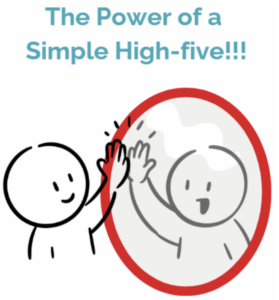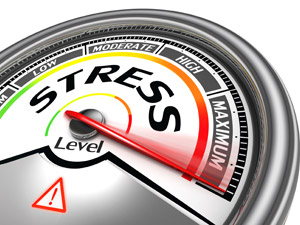We’re always being told to be kinder to ourselves, to give ourselves grace, but the “how” of it can feel elusive—especially when life’s stresses mount up. Enter Mel Robbins’ High Five Challenge: a surprisingly simple yet profoundly powerful daily ritual that could change the way you see yourself.
Here’s the heart of it: each morning, give yourself a high five in the mirror. Yes, it’s that straightforward. You might think, “How could something so small make a difference?” But just as smiling can boost your mood, giving yourself a high five taps into the brain’s powerful reward centres, boosting motivation, resilience, and self-compassion in one simple act.

Why a High Five? Understanding the Power of Self-Acknowledgement
Robbins chose the high five for a reason. Typically, it’s a gesture we use with others—to celebrate, encourage, or congratulate. Turning this symbol of support inward may feel odd, but it’s deeply transformative. Each high five is a moment to say, “You’re doing great. I’m here for you.” It’s about breaking the cycle of self-criticism and replacing it with self-encouragement—a small, symbolic act that starts your day with compassion rather than criticism.
The Science Behind the High Five Challenge
So, how does a high five in the mirror do all this? It comes down to neuroscience. When you high-five yourself, your brain doesn’t distinguish much between self-directed encouragement and receiving it from others. In fact, this act taps into your brain’s mirror neuron system—the area that lights up when we see someone else do something, allowing us to empathize. High-fiving yourself triggers this empathetic connection inward, teaching your brain to view you as a source of support.
There’s also the release of dopamine, the brain’s “feel-good” chemical. Even something as simple as a high five can trigger a small dopamine release, giving you a subtle lift and boosting your resilience. Over time, this positive reinforcement can reshape your mindset, making it easier to tackle challenges and feel optimistic about your goals.
Building Resilience through Self-Compassion
Here’s where the High Five Challenge aligns beautifully with principles of self-compassion. When you give yourself a high five, you’re nurturing a mindset that’s kinder, more forgiving, and ultimately more productive. Research on self-compassion shows that treating ourselves with kindness—especially in times of stress or perceived failure—reduces anxiety and promotes emotional resilience.
Making the High Five a Daily Habit
The beauty of the High Five Challenge is in its simplicity. Because it’s quick and easy, it’s something you can easily add to your morning routine. And repetition is key: the more you high-five yourself, the more natural it becomes. Over time, this ritual becomes a little promise to yourself each day, reinforcing a positive self-image.
Long-Term Benefits of the High Five Challenge
With time, this small gesture can help you shift from self-criticism to self-acceptance. You may find you’re better able to approach goals with a growth mindset, face setbacks with resilience, and remind yourself that self-worth is never conditional on “perfection.” The High Five Challenge fosters an inner strength that can make a world of difference.
In a nutshell, Mel Robbins’ High Five Challenge may be simple, but it’s based on powerful psychology that rewires your brain to see yourself in a new light. It’s a daily reminder that you deserve encouragement, support, and celebration—not just from others, but from yourself.





3 thoughts on “The High Five Challenge: A Simple Act with Profound Power”
I love this and know a friend who could really benefit from it.
This is very deep! I began reading with scepticism, thinking the subject almost laughable. But every word of this article was so logical! It makes such sense, and I want it in my life! (lol) The “mirror high five” is now on my “important habits to cultivate” list!
Done this yet but WILL DO